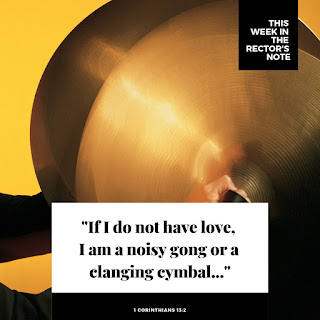Editor's Note: The Rev. Jarrett Kerbel is away this month on his vacation. While he is away our Associate Rector, the Rev. Anne Thatcher, will be writing for the Rector's Note.
“Is it about the liberation of the receiver or the redemption of the giver?” Robert Egger
Many of you have heard the announcements about our One Book, One St. Martin’s selection, Toxic Charity by Robert D. Lupton. We have copies available in the foyer of the Parish House and we had a wonderful turnout for our first discussion in late June. We have another conversation scheduled for Wednesday, August 14th after SUPPER. All are invited: those who attended the last one, those who have not come to one yet, those who have read the book (part or all), and those who are curious to learn more.
The Monday after Bluegrass Mass, both Jarrett and I received an email from a Sunday visitor who heard my announcement about Toxic Charity. He said he was curious so he went home, ordered an e-copy, and read it right away. He shared that he found the book to be transformational in his understanding of ministry, and that as a member of the Diocesan Council (Episcopal Diocese of Pennsylvania leadership), he was recommending that the entire council read the book. What a ringing endorsement! I was delighted that he found the book as transformative as I did.
I discovered this book a few years ago in Washington D.C. when I attended a Faith in Action series with the Consortium for Endowed Episcopal Parishes (CEEP). Our group visited D.C. Central Kitchen (founded by Robert Egger) where I saw a community engagement ministry that truly walks alongside to empower and liberate our neighbors in the communities in which we are situated. They do extraordinary ministry as a nonprofit that hires those who are homeless or released from prison, and trains them in job skills, character building, and community. I encourage you to visit their website and learn more. When I asked about resources to guide me in this different approach to ministry, Toxic Charity was recommended.
Both the trip and the book moved me to deeply reflect on how we approach ministry when we are working with different communities and individuals. Robert Egger asks, “Is it about the redemption of the giver or the liberation of the receiver?” Apparently, it was Robert’s participation on a midnight sandwich run to the homeless with a church in Washington D.C. which was the catalyst for his question to emerge. He noticed that the regular parishioners who participated in this ministry knew the names of the homeless to whom they were giving sandwiches. When he mentioned this observation to one of the volunteers, they said, “Why yes we do,” very proudly. They were proud of the relationship that they had built with the homeless community through this food ministry. But was giving out free sandwiches a liberating act to the homeless? This reflection let Robert (an experienced restaurateur) to found D.C. Central Kitchen as a place to liberate the receiver through employment, job skills training, and a caring community.
This summer Refugee Resettlement Ministry (RRM) is in the process of reflecting on our call to serve immigrants and refugees. What have we learned? Where is God calling us next? And how do we take a new approach to our ministry based on Robert Egger’s question and the learning examples from Toxic Charity? RRM has invited St. Martin’s to read this book and reflect with us on how these lessons apply to our daily lives: whether in church ministry, nonprofit involvement, or volunteer opportunities. Is this all about my resume, my desire to “feel good”, or about “doing good”? Are our acts of ministry purely for our own self-aggrandizement? Or are they truly selfless, seeking to empower and liberate our neighbors? Shining a light on our own intentions illuminates motivations that we don’t always want to admit are there within ourselves. But this illumination is what gives us the gift of self-awareness. Through this journey we can discover how to step out of ourselves and into the shoes of another. Jesus said to God, “Not my will but your will be done”. It is very difficult to remove our own agendas and desires for others and not only let, but actually askGod to step in and lead the way. In handing over the reins, we can discover discomfort at letting go but also relief in following a God who will surprise us and delight us while transforming us. We will learn how to walk alongside our neighbors and liberate them so that we may all be free from injustice and oppression.
Glory to God whose power, working in us, can do infinitely more than we can ask or imagine. (Ephesians 3:20)
Blessings,
The Rev. Anne Thatcher
Associate Rector


